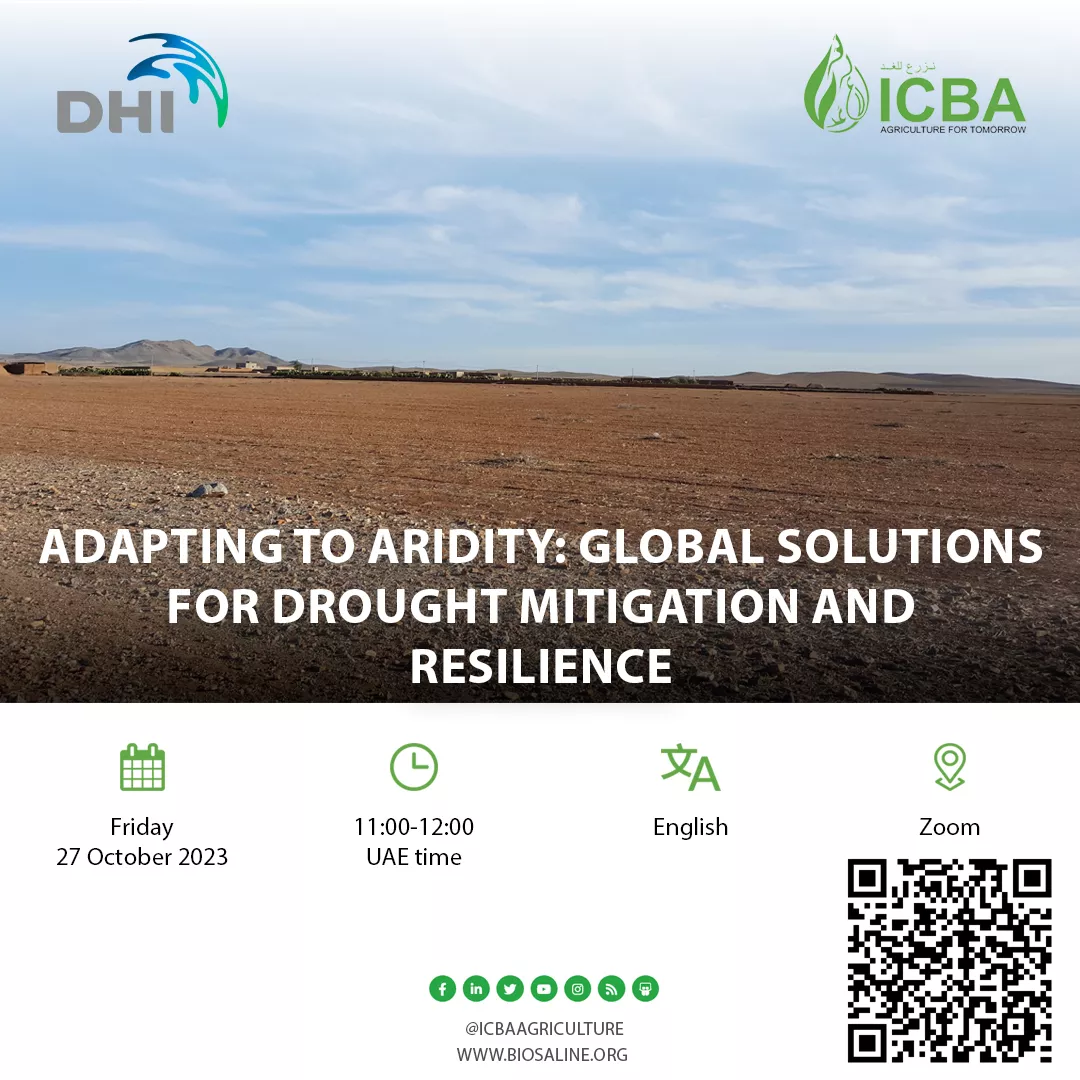Adapting to Aridity: Global Solutions for Drought Mitigation and Resilience
Overview
Droughts pose grave risks to societies, ecosystems, and economies around the world. Between 2000 and 2019 some 1.4 billion people were impacted by droughts to varying degrees.
As climate change makes droughts more frequent, prolonged, and severe, it is clear that the business-as-usual approach to responding to droughts will have more serious consequences for many sectors, especially agriculture and water.
There are many ways to mitigate and adapt to droughts. But it is important to build on previous successes and lessons learned in this field in different countries.
This rationale is behind a webinar organized by the International Center for Biosaline Agriculture (ICBA) and DHI, one of the seven Danish government-approved technology institutes.
The webinar will serve as a platform for sharing ideas and thoughts on how to manage, mitigate and adapt to the impact of droughts and build back better under climate change.
Objective
According to a 2022 report by the United Nations Convention to Combat Desertification, drought frequency and duration has increased by 29 percent around the world since 2000.
And in 2022, over 2.3 billion people faced water stress and almost 160 million children were exposed to severe and prolonged droughts.
The report also notes that the percentage of plants affected by drought has more than doubled in the last 40 years – with about 12 million hectares of land lost each year to drought and desertification.
While water scarcity already impacts 40 percent of the world’s population, as many as 700 million people are at risk of being displaced as a result of drought by 2030.
What is more, drought could affect more than 75 percent of the world’s population and 4.8 to 5.7 billion people could live in areas with water shortages for at least one month a year by 2050.
It is, therefore, necessary to take urgent action and develop and adopt strategies for effective drought management, mitigation, and adaptation. Investments, incentives, and policies in support of initiatives aimed at tackling drought should be increased.
In this context, this webinar will discuss how drought can be better managed, mitigated and adapted to in different parts of the world. In particular, successes and lessons learned will be showcased.
It will also look at resources, policies, and innovations that are necessary for effective drought management, mitigation, and adaptation.
Speakers
The webinar will bring together scientists and experts from ICBA, DHI, the World Bank, the USAID, as well as representatives from Morocco and the Nile River Basin.
- Dr. Tarifa Alzaabi, Director General, ICBA, UAE
- Ms. Mette Vestergaard, CEO, DHI, Denmark
- Dr. Augusto Becerra Lopez-Lavalle, Chief Scientist, ICBA, UAE
- Mr. Rashyd Zaaboul, Climate Modeling Scientist, ICBA, UAE
- Mr. Oluf Zeilund Jessen, Vice President, International Development, DHI, Denmark
- Dr. Daniel Tsegai, Programme Officer, United Nations Convention to Combat Desertification (UNCCD), Germany
- Dr. Modathir Abdalla Hassan Zaroug, Regional Water Resources Modeler, Nile Basin Initiative Secretariat, Uganda
- Prof. Mohammed Yessef, Ecology and Management of Natural Resources Scientist, Institute of Agronomy and Veterinary Medicine, Morocco
- Ms. Louise Heegaard, Partnerships and Funding Mobilization Expert, DHI, Denmark (Moderator)
Agenda
Date and time: 9:00-10:00 CEST / 11:00 – 12:00 UAE time on 27 October
| 9:00 – 9:05 | Welcome remarks - Dr. Tarifa Alzaabi, Director General, ICBA, UAE |
| 9:05 – 9:10 | Welcome remarks - Ms. Mette Vestergaard, CEO, DHI, Denmark |
| 9:10 – 9:15 | Presentation - Prof. Mohammed Yessef, Ecology and Management of Natural Resources Scientist, Institute of Agronomy and Veterinary Medicine, Morocco |
| 9:15 – 9:20 | Presentation – Dr. Modathir Abdalla Hassan Zaroug, Regional Water Resources Modeler, Nile Basin Initiative Secretariat, Uganda |
| 9:20 – 9:40 |
Panel discussion: Successes and lessons learned Moderator: Dr. Augusto Becerra Lopez-Lavalle, Chief Scientist, ICBA, UAE Speakers:
|
| 9:40 – 9:55 | Q&A (moderated by Dr. Augusto Becerra Lopez-Lavalle, Chief Scientist, ICBA, UAE) |
| 9:55 – 10:00 | Recap and concluding remarks – Ms. Louise Heegaard, Partnerships and Funding Mobilization Expert, DHI, Denmark |











